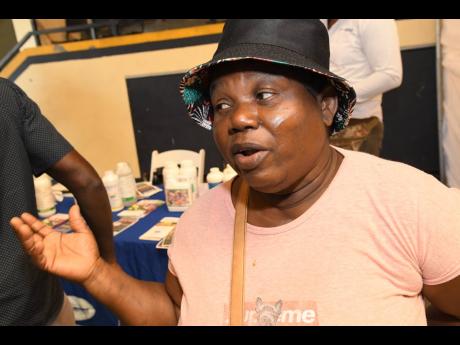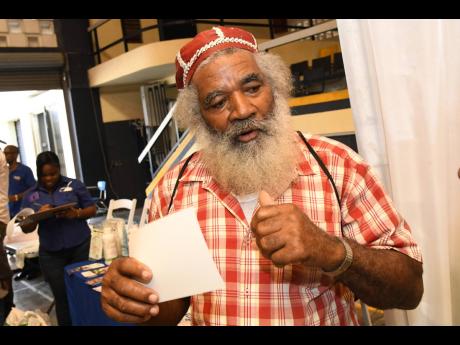‘The coffee start wither up’
Farmers fear huge losses as berries wilt under drought
Local coffee farmers have voiced concern that come harvest season during the months of August to December, a lower crop yield may materialise, resulting in a dent in their earnings.
Speaking with The Gleaner at the Jamaica Blue Mountain Coffee Festival Farmers Trade Day at the University of Technology, Jamaica, on Tuesday, the farmers said that the harshness of the sun’s rays and the scarcity of rainfall have caused the unripe cherry blossoms to wither.
“The drought rough and the market price real terrible. If you [factor in the cost for] the fertiliser and the chemicals, it just nuh add up,” said Gary Tingle, who cultivates a seven-acre farm in Freetown, St Andrew.
Tingle said that a bag of fertiliser costs him upwards of $13,000 and chemicals are being sold for $2,200 and higher per box, so with the time and money invested, the profitability of the farm is under threat, especially when the cost to transport the harvest off the farm is factored in.
The selling price of coffee in 2022 stood at $10,000 per box – a $2,000 increase on the going rate in the previous year.
Farmers, however, argued that this was still low, demanding a raise to $15,000 instead.
Large quantities of Jamaican coffee are sold to importers through an importer-exporter transactions. The average box of unprocessed cherry coffee sold weighs approximately 60 pounds.
“The coffee start wither up; coffee nah ripe,” Tingle said, noting the impact of the current drought.
Sharon Lewis, a farmer from Hayfield, St Thomas, told The Gleaner that although she has drums, she has not been able to properly irrigate the farm.
“Drought a affect we bad, bad ‘cause we nah get any water, and as you see, no rain nah fall, and we can’t get nuh water out a the rocks ‘cause the river dem dry, so the things dem all a dry up so we get less yield,” she lamented.
She expressed fear that the parched land could spontaneously burst into flames.
Crofton Dyer, whose farm is situated in Bath, St Thomas, is seeking assistance from the Ministry of Agriculture and Fisheries and its agencies to acquire a water tank and hoses to tend to his three acres under cultivation.
“Me get fertiliser, me get chemical so me wouldn’t tell nuh lie pon that but when it come to the drought now, water problem cause the young berry dem them [to be] falling off from the tree,” he said.
On Tuesday, the Meteorological Service of Jamaica reported that Wednesday afternoon thunderstorms would primarily affect northern parishes and that scattered showers could be expected across most parishes.
The regulation, promotion, standardisation, and development of the agricultural commodities industry are the responsibilities of the Jamaica Agricultural Regulatory Authority.
The agency’s director general, Peter Thompson, noted during his remarks at the event that the drought was impacting coffee production.
He said that there is need for a plan to see how best to navigate coffee production in light of climate change and to ensure that agricultural partners and agencies worked with the farmers to effectively deal with the issue.
Thompson added that the industry needs to move up the value chain as he implored farmers to set aside earnings from each box of coffee sold to invest in fertilizers and other needed supplies or equipment to enhance their farming experience.
“Many people give up them coffee, y’know, but me nuh give up my own. So me woulda like fi see the coffee [price] to go up more, so we can pay our workers [and] we can survive and farm with whatever materials we want. That is our concern right now,” Dyer, a farmer of over 20 years, said.
Agriculture Minister Pearnel Charles Jr, who was present at the event, said $15 million will be made accessible to help farmers with equipment, organic manure, and fertilizer within the next three weeks.



